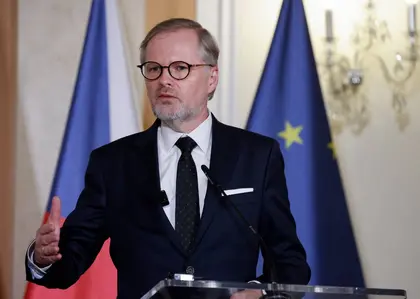On Sept. 4, Mongolia failed to honor the International Criminal Court’s (ICC) arrest warrant for Russian President Vladimir Putin when he visited the country – at the invitation of Mongolia’s president.
Mongolia, as a member of the ICC, has the legal obligation to honor the arrest warrant concerning Putin’s role and complicity in illegally deporting Ukrainian children.
JOIN US ON TELEGRAM
Follow our coverage of the war on the @Kyivpost_official.
But what of the legal consequences when it did not honor its obligation?
Very little, said International Bar Association (IBA) Executive Director and ICC Advisor Mark Ellis – but not all hope is lost.
In an exclusive Kyiv Post interview Ellis acknowledged that it’s a “relatively weak process” and Mongolia would not be removed from the ICC as a state signatory because of the incident. The only penalty likely will be enduring criticism from fellow member states.
“There is a system for the court in what’s referred to as the Assembly of State Parties, which is, in essence, the countries who have signed up to the Rome Statute. But it’s a relatively weak process. So, there are no penalties against Mongolia for having welcomed Putin and not [arresting] him – [apprehending] him – as required under the Rome Statute.
“The Assembly of State Parties [could] create a process to really criticize Mongolia, but that’s about as far as it will be able to go,” said Ellis.

FSB Officer Shot Dead in Moscow Ministry of Defense Building
When asked if it would be possible to have reforms within the ICC to help enforce the court’s decisions, Ellis said the court “certainly has moved as far as [he thinks] it can move.” Ultimately, the ICC doesn’t have a police force, and its enforcement functions rest upon cooperation among the signatory community, he said.
“It doesn’t have a police force. The court relies solely on the good faith efforts of states in the international community to support the court’s decisions and requests.
“So, it all comes back to the commitment of countries, both non-state parties and state parties, to support the court,” he added.
He also emphasized that enforcement relies on the international community, and he said some have an incorrect assumption that the court is to enforce the rulings.
“The enforcement remains on in the international community. I think many people – incorrectly – look to the court and they’ll criticize the court for a perceived failure to enforce their own rulings.
“But again, the court [can’t] do that. It relies on the international community to support the court, and by doing so supports the concept of international law,” Ellis said.
Ellis said there are other avenues countries could pursue to ensure that the ICC’s decisions are respected in the future – political pressure, for one.
“You can put political pressure, which I think is important, I think in this case for Mongolia, being able to pressure and make clear publicly that Mongolia has failed in its responsibility as a state party and, more importantly to me, failed to uphold international law…
“If you have an indicted war criminal with an arrest warrant, the responsibility should be to assist and [ensure] that individual is apprehended and brought to justice. That is the heart of international criminal law [related] to these tribunals,” Ellis said.
However, at the time of publication, the West has yet to impose sanctions on Mongolia because of the incident; Mongolia has cited its reliance on Russian energy as the reason for not arresting Putin.
Though enforcing the ICC’s decisions can be difficult, Ellis maintained that the purpose of Putin’s arrest warrant is also to serve as a deterrent by prohibiting him from traveling to most nations abroad – making him a pariah, he said.
“What an arrest warrant does – particularly for a head of state – it creates a scenario where that individual becomes a pariah…
“The arrest warrant is an instrument that says ‘You will be limited in where you travel,’ so I think there is a deterrent effect here,” Ellis said.
Ellis cited South Africa as an example, where he said international pressure and potential repercussions had prompted it to signal Putin not to visit in 2023.
“Last year, there was thought that he would be traveling to South Africa, and South Africa is a state party to the Rome Statute. And of course, what South Africa did was to – behind the scenes – make it quite clear that it would be inappropriate for … or best for Mr. Putin not to travel to South Africa.
“I’m not sure South Africa ever made it public that it would arrest Mr. Putin, but South Africa certainly didn’t want to be in the situation that Mongolia is in right now, to be faced with that option and that responsibility to arrest.
“Instead, South Africa simply said, ‘Don’t come,’ and that reinforces this deterrent effect,” Ellis said.
“The court is not perfect. It has gaps, and one of the gaps existing is the enforcement gap. But again, this is the responsibility of the international community more than the court,” he added.
You can also highlight the text and press Ctrl + Enter






